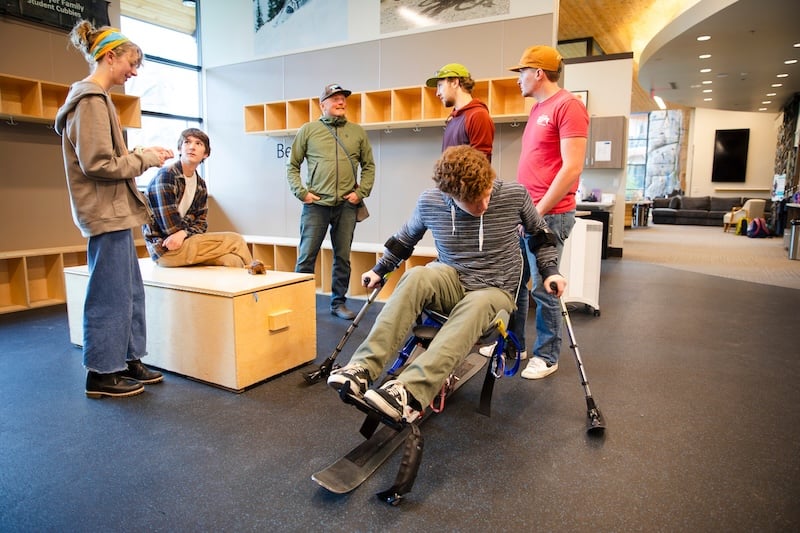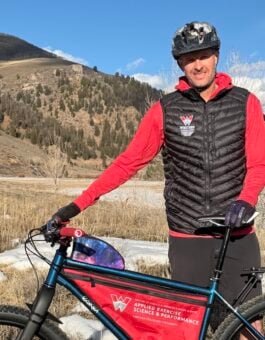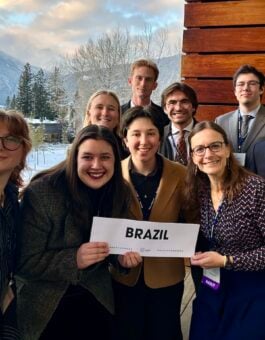Every year, more than 1,000 people with disabilities do the unthinkable: they ski or bike down a mountain trail, kayak whitewater, climb up a rock face, or zipline through a forest, often for the first time, thanks to the incredible people at Adaptive Sports Center (ASC) in Crested Butte.
And behind many of those experiences are current or former students from Western Colorado University.
For many of them, the opportunity to work at ASC starts in Professor Mark Gibson’s class, Recreation and Outdoor Education (ROE) 240: Adaptive Programming, where students “take a deep dive into all the recreational possibilities for persons with disabilities and explore all the latest adaptive equipment, investigate agencies that offer services,” Gibson said. “From this experience, many students become professionals in the outdoor industry and dedicate their professional lives to helping others achieve their full potential.”
On a recent Thursday, the class arrived at the ASC’s four-story headquarters in the Crested Butte Mountain Resort base area, where it’s been located since 2019. They were met by Antonio “Tony” Valdez (‘18), ASC’s Program Coordinator, a Western graduate with a degree in Psychology. After a round of introductions, he started a tour of the building between floor-to-ceiling glass walls at the base of a climbing wall, accessible to anyone who wants to climb it.
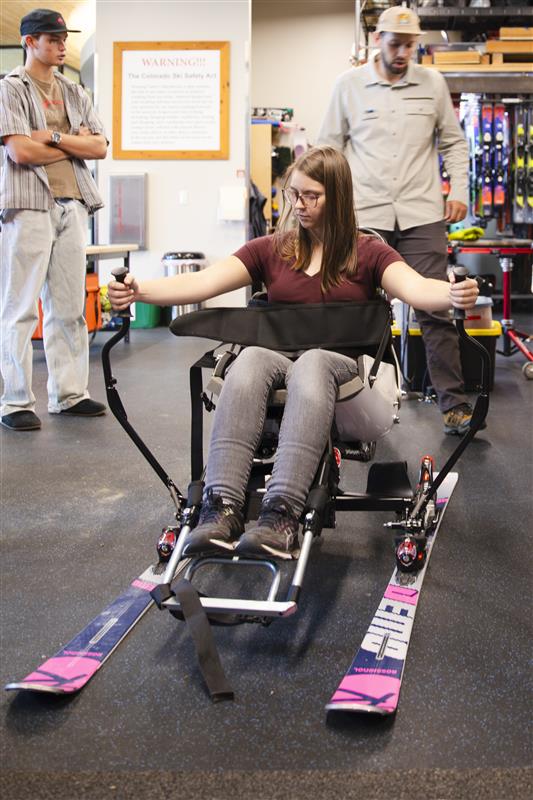
The Adaptive Sports Center was founded in Crested Butte in 1987 with early support from President Jimmy and Rosalynn Carter and a mission to make skiing accessible to all. The organization quickly became a source of local pride, filling an essential need in the industry, and it soon needed to expand into the basement of the Treasury Center.
Over the next three decades, ASC steadily grew to support year-round operations, and today it facilitates roughly 6,000 activities a year and hosts around 12,000 participants annually, including individuals, families, and large groups.
Its current home is a modern steel and glass facility and a fitting cornerstone of the CBMR Base Area. It holds everything anyone would need for a mountain getaway, from overnight guest accommodations (designed after years of listening, learning, and adapting) to an expansive equipment room and the administrative and logistical spaces necessary to operate one of the Valley’s most successful nonprofits.
Through a long-standing partnership with the ASC, students from Western’s ROE program have the opportunity to work as volunteers, interns, and even instructors. Whether they volunteer for a single day or commit to a full-season internship, they join an organization whose work is as technically involved as it is deeply human.
“Working for Adaptive is a unique opportunity,” said Sophie Chiado (’19), a Western ROE grad who is now ASC’s Logistics Coordinator. “It’s not something you stumble into; it’s something you choose to pursue. That intention and enthusiasm are what make our team so special.”
Chiado, who studied both ROE and Business at Western, always knew she wanted to work in the outdoor industry, though she wasn’t sure where. After graduating from Western in the winter of 2019, she tried out a range of jobs across the outdoor industry, from ski instruction and trail mapping to heli-ski operations and luxury trip coordination, she said. Each experience helped her better understand what she values most in her work, which led her to the ASC, where she’s been for three years.
“The technical skills were important, but what made the biggest impact were the lessons in leadership, teamwork, and the confidence to take on new challenges,” she said of her time at Western. “The ROE program created an environment where trying new things was encouraged, and failure was seen as part of learning. I left Western not fearful of what came next, but excited to see what I was capable of.”
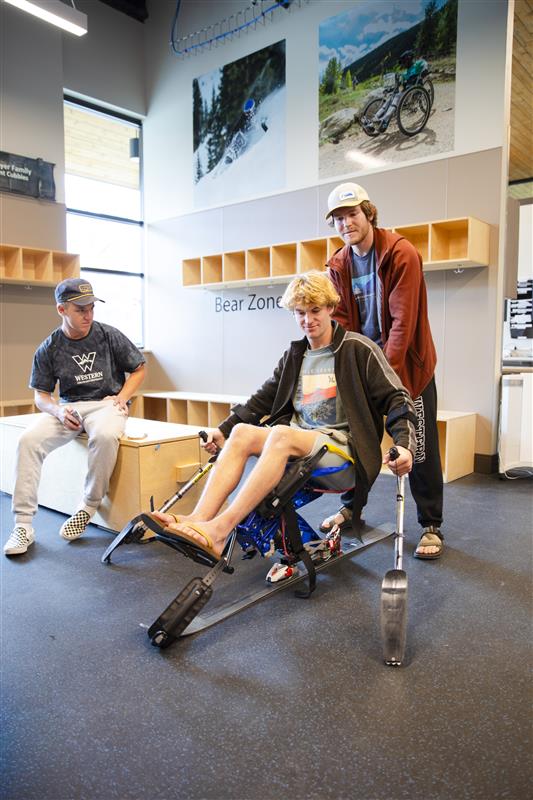
A Better Sense for ‘Why?’
Dr. Gibson himself once sat on the board of the ASC and has seen firsthand the impact its programming can make in people’s lives, whether they’re receiving the instruction or giving it. And whether or not his students choose to pursue a career in recreational therapy, the experience provides a valuable perspective.
His course, required for all ROE majors and minors, includes required volunteer hours that can be spent working for any number of nonprofit or for-profit recreation-based organizations or companies in the Gunnison Valley. But today, they’ll be offered an opportunity unlike any other.
Students get a behind-the-scenes look at the many ways that accessibility was considered in the building’s design before settling in the equipment room to try out adaptive ski equipment and consider the experience from the perspective of someone who may face physical, sensory, or cognitive barriers.
“It isn’t something I’d ever considered,” a student sitting on a mono ski said.
“It’s seriously amazing technology,” one student said after sitting in a snow cart that gives the user control over two skis by manipulating poles like a pair of joysticks.
“I love that they make it a family experience, too,” someone added. “Nobody wants to do something like this alone.”
“It’s definitely important,” her friend agreed. “Imagine dreaming of being able to ski and never being able to. And then coming here and getting the opportunity. This would be the place.”
After trying each of the three pieces of equipment and marveling at the collection of skis, poles, boots, and helmets that covered every wall, Valdez answered questions before he and Chiado laid out the opportunities.
In a typical winter, between five and 10 ROE students contribute hundreds of volunteer hours, some by volunteering occasionally and others logging 80 hours or more to earn a ski pass. Committed volunteers can participate in the Volunteer-to-Instructor program and eventually lead lessons.
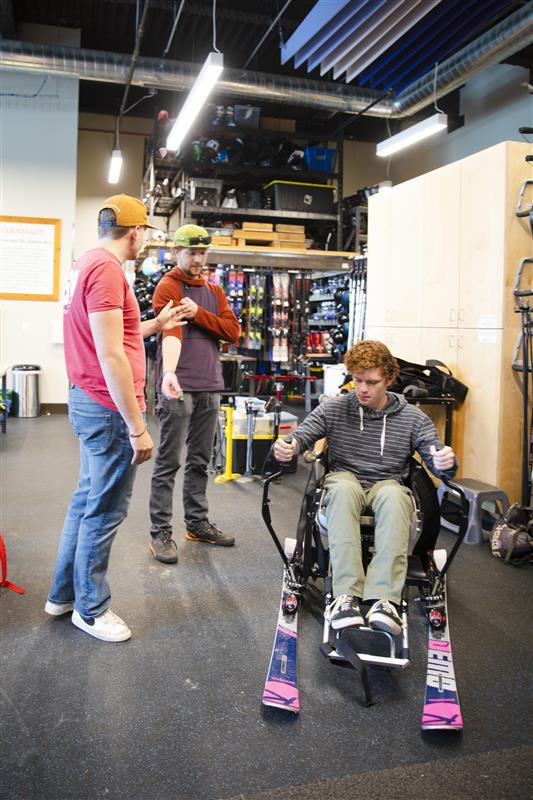
“We’ll put you on lessons, you’ll get to see the process, you’ll get to be super involved. We love that,” Valdez said. “And you’re still getting adaptive experience over ski school experience, which, if you want to be in this field, that experience is really hard to get otherwise.”
For those able to commit to a full-season internship – either post-graduation or during a gap semester – the opportunity grows. Interns receive incredible housing in downtown Crested Butte, a ski pass, base area gear storage, and the chance to take on meaningful roles in programming, fundraising, and marketing.
“We don’t limit what interns can take on; instead, we encourage them to dive in,” Chiado said. “Most leave feeling part of the Adaptive family, feeling supported, challenged, and inspired to keep growing in whatever is next for them. And sometimes that’s coming to work for us!”
Find your calling in the great outdoors.
In Western’s Recreation & Outdoor Education program, you’ll learn to lead, teach, and inspire through adventure. With field-based courses, leadership training, and a strong community of outdoor enthusiasts, you’ll turn your passion for recreation into a career that helps others connect, grow, and thrive outside.
